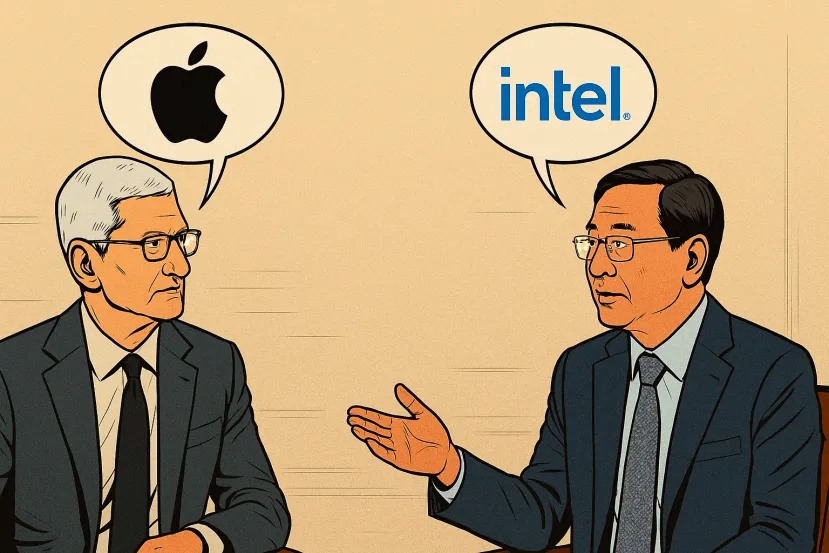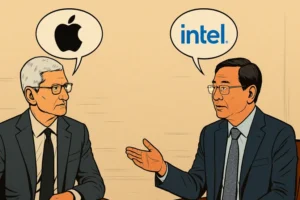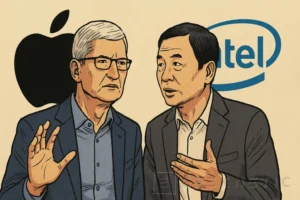Intel opens talks with Apple seeking foundry deals
Intel opens talks with Apple seeking foundry deals as pressure grows to diversify chips
The technology sector never rests, and the strategic alliances that are quietly forged often set the course for the industry. Intel has reportedly begun preliminary talks with Apple to explore possible collaborations and investments. No agreements are on the table yet, but the simple fact that the two companies are reuniting after their split a few years ago is significant.
Apple and its commitment to its own silicon
Since Apple decided to ditch Intel processors in Macs in 2020 and switch to its M1 chips built on ARM architecture, the Cupertino company has shown no signs of going back. The move was a resounding success, consolidated with the M2 and the recent M4, which have demonstrated that Apple knows how to design competitive, efficient silicon with an optimized ecosystem.
Business Korea emphasizes that this strategy will continue. It’s not about returning to relying on Intel as a CPU supplier, but rather diversifying its manufacturing partners. Apple continues to rely almost exclusively on TSMC to produce its chips, a dependence that, in a context of trade and political tensions, could be risky.
Intel Seeks Oxygen in Foundry
Here’s the real interest: Intel’s foundry services. The company has long been trying to regain its lost prestige and position its factories as a viable alternative to Asian dominance. If Apple were to choose to outsource part of its production to Intel, it would not only diversify risks but also strengthen its image in the United States, where policymakers have been calling for years for the semiconductor industry to gain strength locally.
Washington Is Watching Closely
Apple isn’t taking any action without a reason, and the expansion of its domestic investment commitment to $600 billion over four years is a clear sign of alignment with Washington’s priorities. Going from the $500 billion initially promised to this new figure, announced at a White House event, reinforces its role as a strategic player in the US economy.
An agreement with Intel, even if limited to foundry, would serve as a significant political and economic gesture. Cupertino would continue to control its silicon, but at the same time would support a North American partner at a key moment, when tariffs and tensions with China and India threaten to increase prices or complicate supply chains.
What can each side gain?
For Intel, any alliance with Apple would mean a boost to its credibility. Despite having financial and political backing, it needs renowned clients to validate its commitment to its foundry business. Having Apple in its portfolio would be like putting the final seal of quality on the plate.
Apple, on the other hand, would gain a Plan B against TSMC. Although the Taiwanese manufacturer continues to lead the industry with its technical capabilities, relying on a single supplier is never the most prudent course of action. In a scenario of geopolitical uncertainty, having a local alternative in the United States would allow it to strengthen its medium- and long-term strategy.
A delicate balance
However, it’s not all advantages. Integrating Intel as a production partner wouldn’t be easy. Its factories are still catching up with Asian competition, and the transition period could be lengthy. Furthermore, Apple is extremely demanding in terms of efficiency and performance, something TSMC has proven to deliver flawlessly.
Therefore, these talks should be understood as an initial test, a trial run of possibilities rather than an imminent agreement. The two companies know that their interests may converge, but also that there are technical and strategic challenges to resolve.
The future at stake
What does seem clear is that both Apple and Intel share the need to strengthen their position in a rapidly changing market. Apple wants to ensure its independence and mitigate risks; Intel seeks to reinvent itself and demonstrate that it can still be relevant beyond personal computers.
If they finally manage to close a deal, we won’t be seeing a return to the past (when Intel processors were the heart of Macs), but rather a new era: Apple consolidating its commitment to its own design and relying on Intel as an industrial partner, and Intel regaining ground with the validation of one of the most demanding customers on the planet.
Time will tell if this rapprochement materializes, but what it has already achieved is reopening a debate that many considered closed: the role that Intel can still play in the future of Apple and, by extension, in the semiconductor industry.
Source: www.pronetic.geeknetic.es



